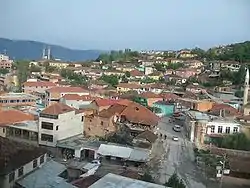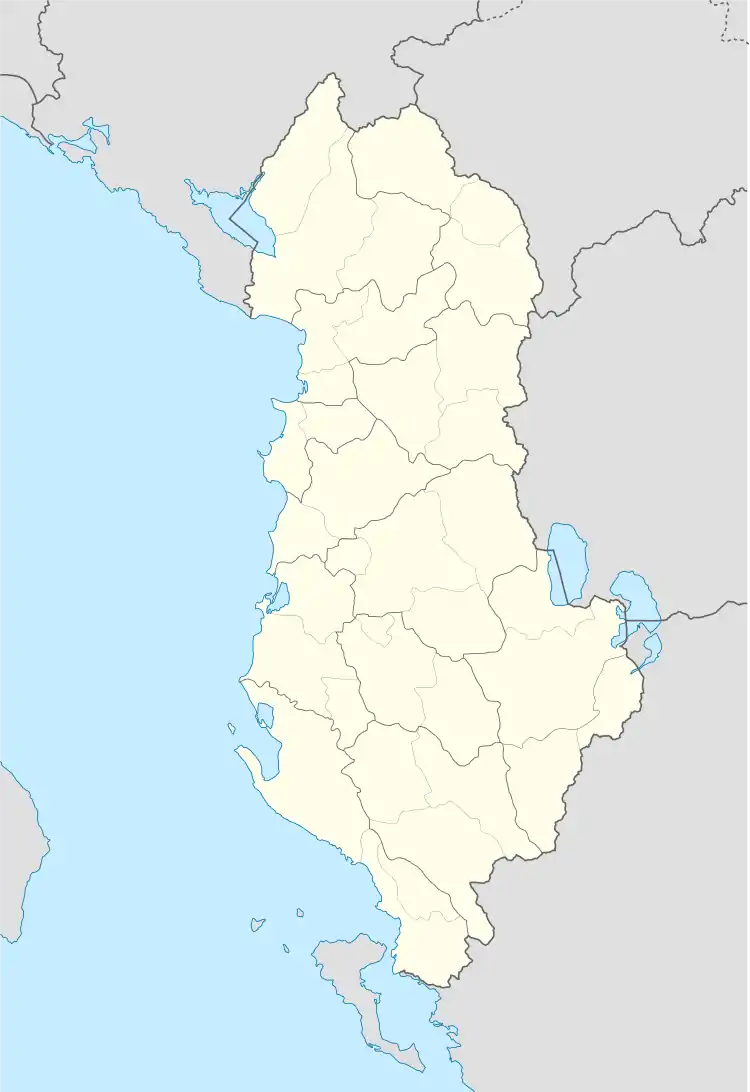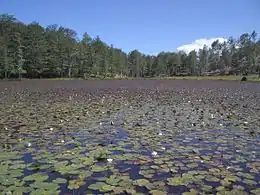Peshkopi
Peshkopi (definite Albanian form: Peshkopia, Latin: Penestae) is a town in Dibër County, northeastern Albania. At the 2015 local government reform it became a subdivision of the municipality Dibër.[1] The population at the 2011 census was 13,251.[2]
Peshkopi | |
|---|---|
 View of Peshkopi | |
 Emblem | |
 Peshkopi | |
| Coordinates: 41°41′00″N 20°25′41″E | |
| Country | |
| County | Dibër |
| Municipality | Dibër |
| Area | |
| • Total | 18.6 km2 (7.2 sq mi) |
| Elevation | 651 m (2,136 ft) |
| Population (2011) | |
| • Municipal unit | 13,251 |
| Time zone | UTC+1 (CET) |
| • Summer (DST) | UTC+2 (CEST) |
| Postal Code | 8301 |
| Area Code | 0218 |
| Website | www.peshkopia.com |
The town is located 187 kilometres (116 mi) away from Tirana, the capital of Albania, and 20 kilometres (12 mi) from Macedonian border, and it sits 651 metres (2,136 ft) above sea level. It is the capital of both the county (Albanian: qark) and district (Albanian: rreth) of Dibër. It is the only county capital in Albania that does not share its name with its county.
Peshkopi lies east of the Black Drin river. The Drin valley is the lowest part of the district. Mineral ores such as chromium, sulphur, and marble have been discovered in the district. It is also an important industrial center in Albania, particularly in relation to the food industry.
History
The region now known as Dibër was inhabited in pre-Christian times by the Illyrian tribe known to the Romans as Penestae, Πενέσται in Ancient Greek (Albanian: penestë).[3]
The name of Peshkopi is derived from the word peshkop meaning bishop in Albanian and from Episkopè in Greek. Bulgarian maps of the eleventh century show the town under the name Presolengrad. The region of Dibër was subsumed under the Orthodox archepiscopate of Ohrid in 1019, and one year later received the status of an episcopate with its center in the Bulke ward of Peshkopi, located in what is now the neighborhood of Dobrovë. The central church of the Dibër Episcopate was that of St. Stephen (Albanian: Kisha e Shqefnit). The seat of the Episcopate would later be relocated, but the town of Peshkopi retained its name.[4] Peshkopi is referenced as early as the fifteenth century under the name Peskopia.[5]
By the beginning of the sixteenth century, the Ottoman Empire had completed its conquest of Albania.[6] Under the rule of the Ottoman Empire, Peshkopi (then Debre-i Zir, which meant "Lower Debre" in Ottoman Turkish) was a small market town, overshadowed by the larger and more flamboyant Debar (Albanian: Dibra e Madhe, "Greater Dibër"), which today lies just over the Macedonian border. The population of Peshkopi was almost completely Muslim by 1583. In 1873 an Ottoman barracks was built in Peshkopi, housing up to 8,000 soldiers.[4]
The Dibër region, including Peshkopi, took part in the uprisings against Ottoman authority that were occurring throughout Albania in the early 1910s. Albanian armed bands (Albanian: çeta) captured Peshkopi from the Ottomans on August 16, 1912.[7]
In the aftermath of the breakup of the Ottoman Empire, a Serbian army invaded Dibër and entered Peshkopi in early December 1912. Albanian forces retook the city on September 20, 1913.[8] A Bulgarian army invaded Peshkopi on January 1, 1916. The Austro-Hungarian Empire, an ally of Bulgaria, brought an army to Peshkopi on April 12, 1916, and engaged in punitive house-burnings and executions throughout the region in an attempt to quell local resistance. The Bulgarians and Austro-Hungarians departed the area in September 1918.[9]
Italian forces invaded Albania in 1939, reaching Peshkopi on April 15.[10] Albanian Communist partisans retook Peshkopi on September 9, 1943. The following October, the partisans defeated Balli Kombëtar forces in an armed battle for control of the city. In July 1944, German forces occupied the city, but were expelled later that same month. Fighting continued in the Dibër region until early September, leaving the Communist-dominated National Liberation Army (Albanian: Ushtria Nacionalçlirimtare) in control.[11]
Education
Tertiary
Peshkopi briefly had a branch of Aleksandër Moisiu University. It was closed in 2017 by order of the national Ministry of Education for alleged failure to meet standards.
Secondary (grades 10-12)
- Said Najdeni High School
- Nazmi Rushiti Professional School
Elementary/middle (grades 1-9)
- Selim Alliu
- Demir Gashi
Tourism
The predominant form of tourism in the region is mountain tourism, due to the hilly terrain and large amount of forest. In the district of Dibra lie two of the thirteen national parks in Albania, Lurë National Park, and Korab-Koritnik Nature Park which offer mountain tourism in the winter and summer, including climbing, walking, skiing, trekking, picnics, hunting, kayaking, etc.
The museum, located beside the general secondary school, houses a collection of local costumes, carpets, kitchen equipment and filigree jewelry, as well as a number of models of local architecture.
Elez Isufi Boulevard is a pedestrian-only street lined with linden (Albanian: bli) trees.
Thermal mineral water springs and sulphur baths (Albanian: llixha) in the vicinity of Peshkopi are a draw for seasonal tourism, primarily from within Albania, but also to a lesser extent from neighboring countries. They are reputed to alleviate some health issues.[12] The baths are located a short distance east of the city, upstream along the creek which runs through the middle of Peshkopi.
Sports
The main sport played in Peshkopi is football. The city's main team is KF Korabi Peshkopi and its home stadium is Korabi Stadium with a capacity of 6,000 spectators. The multidisciplinary club's home arena is the Bashkim Lala Sports Palace, which has a capacity of over 2,000 spectators. KF Korabi currently plays in the Albanian First Division. They were runners-up in the 1961, 2015–16 Albanian First Division going in to the Albanian Superliga.
Transportation

Bus
Peshkopi is served by bus lines to and from Tirana and Durrës. These depart in the morning on a fixed schedule. There are also minibuses and vans (Albanian: furgona) serving a wider set of destinations, which depart when sufficiently full. Minibuses to Tirana and Durrës are generally somewhat more expensive than the equivalent bus route.
Train
There is no train service to Peshkopi.
Highways
The main road to Peshkopi is SH6 (State Road 6). A new highway called the Arbër Highway (Albanian: Rruga e Arbërit) is currently under construction. It is projected to link Tirana with Debar, North Macedonia and will connect with SH6.
Notable people
- Gëzim Alpion- Academic
- Cen Elezi- bayraktar of Dibra
- Bashkim Gazidede- Politician
- Elez Isufi- nationalist figure
- Denisa Kola- Miss Albania 2003
- Gentjan Manuka- footballer
- Elvis Prençi- footballer
- Xhelil Çorja- WWII fighter
- Qazim Laçi- footballer
- Hasan Çipuri - Academic
References
- Law nr. 115/2014 Archived 2015-09-24 at the Wayback Machine
- 2011 census results Archived 2016-03-03 at the Wayback Machine
- Sinani, Rakip (2005). Dibra dhe dibranët në faqet e historisë [Dibër and the Dibrans in the Pages of History] (in Albanian). Tiranë: KTISTALINA-KH. p. 20. ISBN 99943-625-8-5.
- Moisi Murra (January 2010). "Qyteti i Peshkopisë nga lashtësia në ditët tona" [The City of Peshkopi from Antiquity to the Present Day] (PDF). Rruga e Arbërit (in Albanian). p. 8. Archived (PDF) from the original on 2011-07-10. Retrieved 2010-02-15.
- Sinani. p. 248. Missing or empty
|title=(help) - Sinani. p. 39. Missing or empty
|title=(help) - Sinani. p. 138. Missing or empty
|title=(help). - Sinani. pp. 150–160. Missing or empty
|title=(help) - Sinani. pp. 168–170. Missing or empty
|title=(help) - "Gazeta Shqiptare". 1939-04-16. Cited in Sinani. p. 209. Missing or empty
|title=(help) - Sinani. pp. 221–240. Missing or empty
|title=(help) - "Blue Albania - We help you to explore Albania... - Portali me i madh turistik Shqiptar". BlueAlbania. Archived from the original on 21 July 2017. Retrieved 23 April 2018.
| Wikimedia Commons has media related to Peshkopi. |


